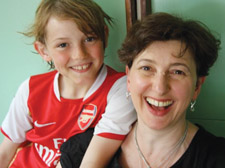|
|
 |
| |

Julia Hobsbawm with one of her sons, Roman |
‘How to do it’ guide for the generation who decided to have it all
In a society where women are under pressure to juggle commitments as parents, partners and workers, Julia Hobsbawm offers some hard-won advice on balancing a career with a healthy home life, writes Dan Carrier
The See-Saw: 100 Ideas for Work-Life Balance. By Julia Hobsbawm. Atlantic Books
WHEN Islington Council decided to double the fees for three-year-old Wolfie’s nursery in Archway, little did they realise his mother was not going to simply say “Ok”, and pay up.
Julia Hobsbawm, the daughter of communist academic Eric Hobsbawm, was enraged enough to set up a campaign – and force the Town Hall to freeze the cost of childcare for existing parents at Archway Under-Fives Centre.
“I briefly transformed myself into an ardent campaigner,” she recalls. “We started to complain at the 11th hour, which was the earliest we understood what was going on.
“I did all the things that instant campaigners do: I sat up all night pulling information from the internet; I mobilised mums and dads and co-opted the local paper; I put up posters, wrote letters, lobbied councillors.
“I cajoled, threatened and ballooned in self-righteous indignation for all the parents who, like me, were going to have to unpick all their family finances...”
Julia won: but the stress was too much. “I was so exhausted from the instant campaign on top of everything else that as soon as my summer holiday began I collapsed in a heap with pneumonia and ended up in hospital,” she recalls. “Looking on the bright side, at least I got some rest there – and we could continue to send our boy to nursery.”
The “on top of everything else” included setting up a new business, which made headlines. Her company, Editorial Intelligence, sought to broker a common ground between the work of PR companies and journalists, became a story in itself. It was criticised for blurring the lines between the two.
Now Julia is passing on her experience of running a headline- making company while being a parent and running a bustling home. Called The See-Saw, the book is full of snappy buzzwords and “top tips” on how to balance work and life.
It is, she says, a handbook for 21st-century living, bursting
with hard-won practical advice for the “generation dedicated to having it all”.
Julia draws on her own experience of being a stepmother (her husband’s two children are called “steppies”) as well as looking after three of her own – Roman, Anoushka and Wolfie.
As the case studies illustrate, this is a book aimed squarely at people with successful careers – people who are firmly rooted in the metropolitan middle-class.
For example, much of her advice relies on things that for many are simply not attainable, such as the instruction to “go away without the kids at least two times a year”, something which is beyond the means of most of us.
“My book says: Yes, sometimes it is a nightmare but there are ways to manage the juggle,” she says. “It’s about letting things go a bit without letting yourself go. For example, we do not have a cleaner, we do not have a spotless house. You have to remember what is important.”
It also means not turning your children into status symbols – a malaise that affects the middle-classes and makes both them and the parents unhappy and dissatisfied: “Do they need to do lots of things after school each day? Or will that stress both you out organising it and them out doing it?” she writes.
Julia’s book touches on more complicated topics that shift away from what you do as an individual to how society can make life a little easier. “I am not a politician,” she states. “But our research shows that there are huge financial penalties in working and having children. The government has lots of initiatives regarding childcare but it often appears little of this is joined up.”
Policy-makers could be more aware of the demands put on parents who need to juggle work with the responsibility of bringing up children, she says.
Using common sense – such as forgetting the strictures of society, which says fathers should do one role while mothers do another – and throwing in a huge dollop of trendy buzzwords, Julia’s 100 ideas for a work-life balance paint a utopian picture of how to enjoy a career while bringing up a gang of happy and contented charges.
Essentially, her advice could be distilled into two words: chill out.
•
|
| |
|
 |
 |
|
 |
|


